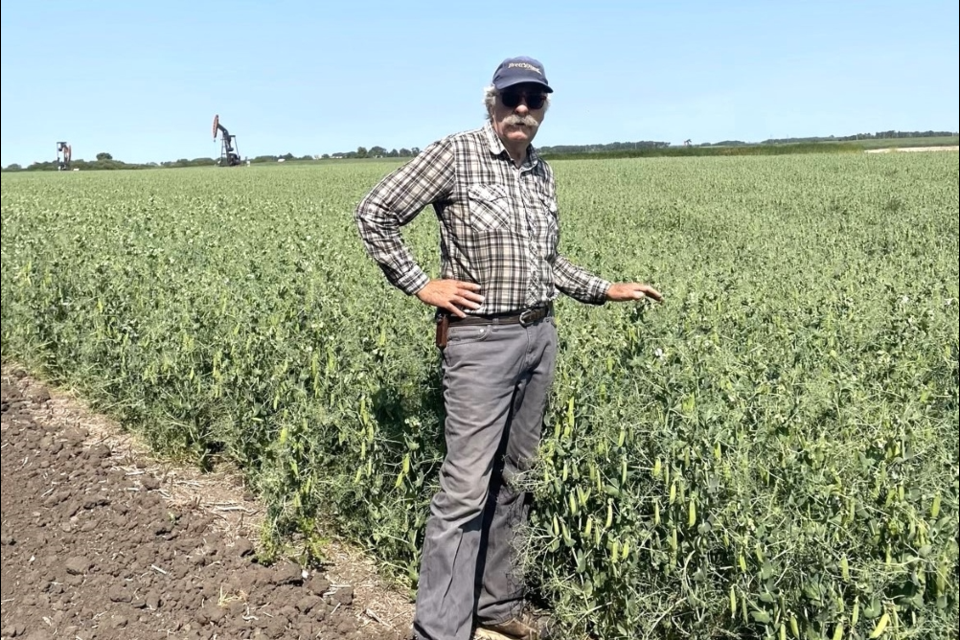OXBOW - Wayne Amos has been a farmer for many years near Oxbow.
During those years, family and friends suggested to him that becoming a qualified producer of seeds would really suit him, as he was fussy about his seed.
In 1997, Amos and his partner Lori Erhardt began taking the steps to become independent seed retailers.
Big Dog Seeds was born, and the company was named after the St. Bernard dogs they have on the farm.
When 2002 rolled around, Big Dog Seeds became a select grower, which qualified them to produce plots of the highest generation.
There is an astonishing number of steps to ensure the seeds remain pure, and the germination of the seed is high.
Each piece of equipment that enters the fields must be cleaned from front to back and top to bottom, not missing a square inch.
This includes all tractors, wagons, air drills, combines and trucks.
Some machinery is pulled apart when possible and vacuumed to ensure every speck is cleaned.
They do not perform custom crop work or loan equipment, and everything they use remains on the farm.
Grain bins are swept, from top to bottom, and vacuumed, making sure not one stray seed remains behind.
Cleaning the combines takes five hours with two or three people.
Once in the field, the first 80-100 bushels of seed from the combine, are purged to be sold as commercial grain.
Seed crops are planted on 60 per cent of the farmland and the remaining is in commercial crops.
Each crop has a three-metre perimeter isolation strip around the field to avoid cross contamination.
When new breeder seed is introduced, it is planted on 2.4 acres or less.
This plot is walked several times by three or four people, walking a metre apart, pulling the non-bearded and short heads to keep the crop pure. Non-bearded are the hairs that are not present on the heads.
Checking these plots is very labour intensive, as it needs to be done on a regular basis and is very time consuming.
A third party will come in and inspect the crops as well, and this is an additional cost.
From there, the inspector's report is sent to Canadian Seed Growers where it is analyzed. If it passes, a certificate is presented. If it does not pass, the seed then becomes commercial grain.
Over the years, Amos and Erhardt have received over 300 certificates of pedigreed seed for flax, winter wheat, peas, lentils and oats, to name a few.
Once the seed is harvested, it goes to their cleaning plant.
In this process, the smaller seeds, chaff and dirt are removed. The gravity table provides a higher standard of cleaning.
Every three years, an inspection is done on the farm, and once a year, the retained seed samples are sent to the Canadian Food Inspection Agency to be checked for purity.
Along with inspections, seeds are sent to the seed lab to evaluate for germination, disease and cold vigor. The seed is frozen for this step for its hardiness.
Amos is also a licensed grader. This means when they are cleaning the seed, every hour a one-kilogram sample is checked for purity and to make sure it exceeds the standards for the class of grain they are cleaning.
These samples are kept in case they are audited.
Amos said the paperwork when he farmed was a lot, but now the it is crazy as every little detail must be accounted for.
For the 2024 season, they have a selection of seeds including non-GMO soybeans for farmers and companies to plant.
In 2016, they received the Outstanding Service Award from the Saskatchewan Seed Growers in Saskatoon, and they are immensely proud and honoured to have received this.
Amos and Erhardt will continue to strive for excellence in the crops they grow to obtain the purity and highest standards in pedigreed seed that they can achieve.




